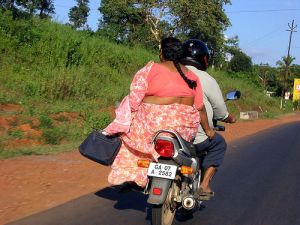Andrea Rinaldi
Freelance journalist, SciDev.Net
The need for networking and the challenges posed by diversity within the vast Arab world are two of the issues that emerged prominently from the Boosting research for health in the new Arab world meeting in Bellagio, north Italy which ended on Friday (1 March).
No one doubts that much cooperation and coordination will be necessary in order to tackle the research for health demand, but it is honestly difficult to see how virtually failed states such as Somalia, economically advanced realities like the Gulf States, and the Maghreb and Mashriq countries with their variable income levels, can be brought together to put forward a unified vision for public health in the region.
Up to now, there has been very limited dialogue among these countries, and not only regarding research- or science-related issues (the overall value of trade exchange between Arab countries, for example, is low). However, those involved in the health research agenda are positive that diversity in the Arab world, if wisely used, can actually benefit the requested change, as delegates present at the Bellagio meeting told SciDev.Net.
“Diversity should be perceived as an important factor for complementarity instead of a reason for division,” said Ziad Abdel Samad, Executive Director of the Arab NGO Network for Development in Beirut, Lebanon. “There is the necessity to create processes at various levels that must include academia and research. I’m aware of many existing initiatives among different universities and research centers focusing on health from different countries of the region.”
Samer Jabbour, from the Faculty of Health Sciences of the AmericanUniversity of Beirut, Lebanon, said: “All countries have a stake in cooperation as it will promote development and contribute to stability and legitimacy. Regional cooperation based on solidarity is simply the right thing to do. But we need to push, and from the bottom up, for this to happen in light of a prior history of poor functioning of formal regional platforms for common work. This is the task ahead of us.”
The role of the Gulf States might play in the effort is a matter of particular importance, given both their economic prominence and the considerable resources some of them, notably Qatar, dedicate to R&D.
Hanan Abdul Rahim, at QatarUniversity in Doha, Qatar, said: “There is a great interest in the Gulf in developing R&D systems. For example, Qatar partners with well known international universities in specific fields, such as medicine, engineering, and computer science, and links to a number of international research initiatives.”
“At the same time, the Qatar National Research Fund presents an opportunity for research collaborations with all parts of the world. Regional and international collaborations are not mutually exclusive. One does not have to preclude the other,” said Rahim.
But some believe that, in order to lead the research-for-health revolution in the new Arab world, the Gulf States must genuinely believe in their spearheading function while seriously reconsidering their attitude towards neighbours and potential partners.
“Regarding the Gulf states, many in the region want to see them play a greater role in promoting health and development,” said Jabbour. “This is another subject for advocacy for those interested in promoting research for health and development.”
But Abdel Samad said that “Gulf countries are supporting other Arab and Islamic countries; they are even considered among the largest donors worldwide. However, most of their donations are dedicated to charity and faith based initiatives. Few of these donations are directed to fund development programs and research projects.”
There is a lack of structured and transparent process of selecting partners and programs, and the way support is channelled is often conditioned by subjective choices, which highly affects the impact of allocated funds, argued Abdel Samad.
“This is a source of frustration which is leading people in the Arab world to rather address foreign donors that have their own requirements and conditions,” said Abdel Samad. “The objective is to advocate the Arab donors in order to motivate them to change this perception, and to create a properly transparent system, participatory methodologies and efficient strategies for implementation.”
This blog post is part of our coverage of Boosting Research for Health in the New Arab World meeting which takes place 26 February – 1 March 2013, in Bellagio, Italy. To read further news and analysis please visit our website.




 Posted by scidevnet
Posted by scidevnet 









You must be logged in to post a comment.